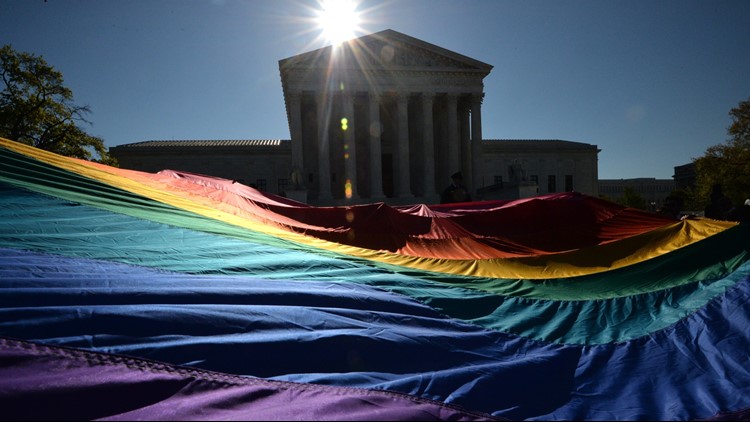RICHMOND, Va. — In front of a national audience, Gov. Glenn Youngkin made some claims about same-sex marriage in Virginia that are now making waves.
"We actually do protect same-sex marriage in Virginia," he said on Face The Nation. "That's the law in Virginia, and as the governor of Virginia, we protect same-sex marriage."
This statement received backlash from some Democratic lawmakers, who said this is not the case.
"Let's set the record straight," said State Sen. Adam Ebbin in a Tweet. "Virginia's Constitution explicitly BANS same-sex marriage..."
With so much political disagreement, the Verify team looks at what protections exist for same-sex couples under the Virginia Constitution and Virginia law.
QUESTION:
Does the Virginia Constitution ban same-sex marriage?
SOURCES:
- Virginia Constitution, Article I - Section 15-A, Marriage
- SB 17, Same-Sex Marriages; Civil Unions
- SJ 5, Constitutional Amendment; Fundamental Right To Marry, Same-Sex marriage Prohibition
- Craig Konnoth, Professor of Law at University of Virginia School of Law
- Dick Howard, Distinguished Professor of Law at the University of Virginia.
ANSWER:
Yes. Virginia's Constitution still defines marriage as being between one man and one woman. As of now, this constitutional language is unenforceable due to the 2015 Supreme Court case Obergefell V. Hodges, which guaranteed the right to same-sex marriages nationwide.
In 2020, a bill was passed that changed statutory law, but it did not alter the constitution. There has also been an effort to change the constitutional language, but so far this has failed.
WHAT WE KNOW:
The Virginia Constitution is clear on this issue. The first sentence of Section 15-A of the Bill of Rights, outlining the rules on marriage, reads as follows:
"That only a union between one man and one woman may be a marriage valid in or recognized by this Commonwealth and its political subdivisions," the section reads.
This constitutional language is currently unenforceable due to the 2015 Supreme Court decision on Obergefell V. Hodges, guaranteeing the right to same-sex marriages nationwide.
If this landmark case were overturned, it's likely that this constitutional ban on same-sex marriage would kick back into place, said Craig Konnoth, a professor of law at the University of Virginia School of Law.
"If the court were to overturn Obergefell, I do not think same-sex couples in Virginia would be protected," he said. "Because the constitutional amendment would override any statute."
Statutory law does protect same-sex marriage in Virginia. In 2020, the Virginia General Assembly passed a bill that repealed the "statutory prohibition" of same-sex marriage. This bill did not change the constitutional language. The summary of the bill reads as follows:
"Repeals the statutory prohibitions on same-sex marriages and civil unions or other arrangements between persons of the same sex purporting to bestow the privileges and obligations of marriages. These prohibitions are no longer valid due to the United States Supreme Court decision in Obergefell V. Hodges."
A spokesperson for Youngkin said that this 2020 bill was the basis for his comments on Face The Nation.
"Same-sex marriage is the law of the land in Virginia," the spokesperson said. "And as governor of Virginia, he will abide by and enforce the law."
State Sen. Adam Ebbin was the sponsor of this 2020 bill and said that it does not fully protect same-sex couples, due to the lingering constitutional language.
"As a gay Virginian and as someone who represents a lot of people who are concerned with equality for all Virginians, it concerns me that such an important right could be so tenuous and hanging on by the will of Clarence Thomas and the Conservative Supreme Court majority," Ebbin said.
Konnoth said that this 2020 statute is likely not enough to void the constitutional language banning same-sex marriage.
"If you look at the statute that was passed, it purports only to void sections of the Virginia code that prohibited same-sex marriage," Konnoth said. "It did not state that the Constitution could be changed."
Another constitutional expert from the University of Virginia, Dick Howard, agreed.
"If Obergefell were to be overturned, then, in Virginia, the marriage amendment would take precedence over any conflicting provision of state law," Howard said. "Same-sex marriages would not be recognized in Virginia."
Ebbin has previously pushed for a constitutional amendment, but so far this has been unsuccessful. In order to amend the Virginia constitution, the General Assembly must pass resolutions in two separate sessions, with an election in between.
In February 2022, the Virginia Senate did pass a constitutional amendment protecting same-sex marriages, but this measure failed to make it out of committee in the Virginia House of Delegates.
Mary Bauer, a spokesperson for the ACLU of Virginia, expressed concern with Youngkin's comments as well, writing the following in a statement:
"Governor Youngkin’s assurance that same-sex marriage is protected by law is disingenuous at best. While it’s true that Virginia repealed its statute prohibiting same-sex marriage, it has not removed the constitutional provision prohibiting same-sex marriage, which was adopted in 2006. It is not at all clear what would happen if the Supreme Court overturns Obergefell, but Virginians should be deeply concerned about this, given Justice Thomas’s concurrence indicating an interest in overturning Obergefell. It is well past time for Virginia to remove the hateful language from its constitution to protect all marriages in the Commonwealth. There was an effort recently to do that, but it was thwarted by the House of Delegates. A constitutional provision is going to take precedence over any statute. The fact that this bigotry is enshrined in our constitution should embarrass all Virginians. Public opinion has changed dramatically over the past decades such that a strong majority of Virginians support same-sex marriage. Our laws and policies should reflect that and protect all Virginians."
So we can verify, yes, Virginia's Constitution currently bans same-sex marriage.



